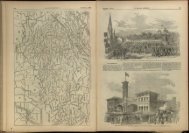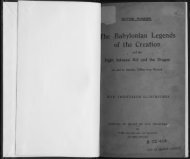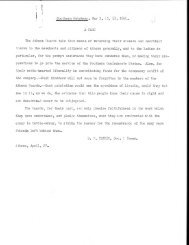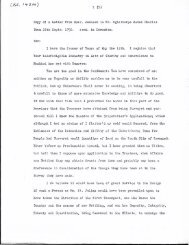THE SHE KING; OR, THE BOOK OF ANCIENT POETRY
THE SHE KING; OR, THE BOOK OF ANCIENT POETRY
THE SHE KING; OR, THE BOOK OF ANCIENT POETRY
You also want an ePaper? Increase the reach of your titles
YUMPU automatically turns print PDFs into web optimized ePapers that Google loves.
16 <strong>THE</strong> SOURCES <strong>OF</strong> <strong>THE</strong> ODES AS A COLLECTION.<br />
States; of the Books of the three August [rulers] and of<br />
the five emperors. They communicated to all parts of<br />
the kingdom the writings [in their charge] "l For want<br />
of fuller information it is not easy to give a thoroughly<br />
satisfactory account of the Histories and the Books refer<br />
red to in these brief sentences; but I quote them merely<br />
to establish the fact that, according to the constitution of<br />
the kingdom under the dynasty of Chow, not only were<br />
the literary monuments of the feudal States collected for<br />
the satisfaction of the kings, but they were again sent<br />
forth to the courts of the different princes, and became<br />
the common possession of the cultivated classes through<br />
out the whole country. The documentary evidence of<br />
the fact is scanty, owing to the imperfect condition in<br />
which the Books of Chow were recovered during the Ilan<br />
dynasty, and so we have no special mention made of the<br />
odes in the passages of the " Official Book/' which I have<br />
adduced; but that they, as well as the other writings<br />
which are vaguely specified, were made known to Loo,<br />
Tsfe, Tsin, and all the other States, seems to have the<br />
evidence of analogy in its favour, and to be necessary to<br />
account for the general familiarity witli them which, we<br />
know, prevailed.<br />
G. But if the poems produced in the several States<br />
were thus collected in the capital, and thence again dis<br />
seminated throughout the kingdom, we might conclude<br />
that the collection would have been far more extensive<br />
and complete than we have it now. The smallness of it<br />
now the coi- is to be accounted for by the disorder and<br />
Email" aid to- confusion into which the kingdom fell after<br />
complete. t}ie lapse of a few reigns from king Woo.<br />
lloyal progresses ceased when royal government fell into<br />
1 These Histories, it is held, related to everything about the feudal<br />
States, and the outlying barbarous tribes, the history of their princes and<br />
chiefs, their origin and boundaries, their tributes*, their ceremonies, music,<br />
customs, &c. We try in vain to discover what the Books of the three<br />
August ones were. The second sentence is the most important for my<br />
argument. I cannot accept the interpretation of " the writings," in which<br />
many acquiesce, as simply = the names of the written characters. Biot<br />
gives fcr the whole : " Us sont charges (le propafter les noms ecrits, o il,<br />
IPS signes de 1'ccriture, dans les quatre parties de 1'empire." I believe<br />
that I have given the sense correctly.<br />
<strong>THE</strong> SOURCES <strong>OF</strong> <strong>THE</strong> ODES AS A COLLECTION. 17<br />
decay, and then the odes were no longer collected.1 We<br />
Lave no account of any progress of the kings during the<br />
period of the Ch'un Ts'ew. But, before that period,<br />
there is a long gap of 143 years between kings Ch'ing<br />
and E, covering the reigns of K'ang, Ch'aou, Muh, and<br />
Kung, of which we have no poetic memorials, if we ex<br />
cept two doubtful pieces among the sacrificial odes of<br />
Chow. The reign of He'aou who succeeded to B is simi<br />
larly uncommemorated, and the latest odes are of the time<br />
of Tiug, when a hundred years of the Ch'un Tsfe\v had<br />
still to run their course. I cannot suppose but that many<br />
odes were made and collected during the 143 years after<br />
king Ch'ing. The probability is that they perished<br />
during the feeble and disturbed reigns of B, Heaou, B,<br />
and Le. Of the reign of the first of these we have only<br />
five pieces, of all of whioh Choo considers the date to be<br />
uncertain ; of that of the second, as has been observed '<br />
above, we have no memorials at all ; of that of the third<br />
we have only one piece, which Choo, for apparently good<br />
reasons, would assign to a considerably later date. Then<br />
follow four pieces, the date of which is quite uncertain,<br />
I and eleven, assigned to the reign of Le, some of them<br />
with evident error. To Le's succeeded the long and<br />
vigorous reign of Seuen (B.C. 828 781), when we may<br />
suppose that the ancient custom of collecting the poems<br />
was revived. Subsequently to him, all was in the main<br />
decadence and disorder. It was probably in the latter<br />
part of his reign that Ch'ing-k caou-foO, an ancestor of<br />
Confucius, obtained from the Grand music-master of the<br />
conrt of Chow twelve of the sacrificial odes of the previous<br />
dynasty, with which he returned to Sung which was held<br />
by representatives of the House of Shang. They were<br />
used there in sacrificing to the old kings of Shang, and<br />
were probably taken with them to Loo when the Kfung<br />
family subsequently sought refuge in that State. Yet of<br />
the twelve odes seven were lost by the time of Confucius.<br />
The general conclusion to which we come is, that the<br />
existing Book of Poetry is the fragment of various col<br />
lections made during the early reigns of the kings of<br />
Chow, and added to at intervals, especially on the oc-<br />
TOL. m.<br />
See Mencius, IV. ii. XXI.<br />
2








